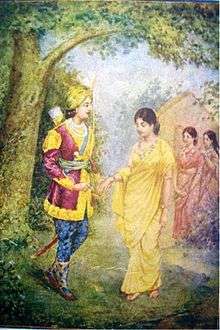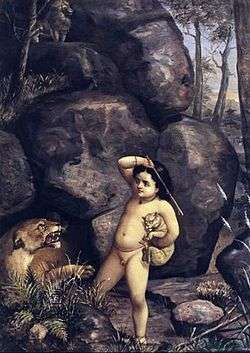Dushyanta
Dushyanta (Sanskrit: दुष्यन्त) is a king in classical Indian literature and in Indian History (before 5000 years BC ) . He was the husband of Shakuntala and the father of the Emperor Bharat. He appears in the Mahabharata and in Kalidas's play The Recognition of Sakuntala (c. 300 CE). His name is also transliterated as Dusyanta or Dushyant, and means "Destroyer of the Evil" in Sanskrit.
| Dushyant | |
|---|---|
| Mahabharata character | |
 Dushyant and Shakuntala | |
| In-universe information | |
| Spouse | Shakuntala |
| Children | Bharata |
King Dushyant
According to the Mahābhārata, Dushyanta is the son of Ilina and Rathantara.[1] He was king of Hastinapur and ancestor of the Kuru dynasty. Dushyant met his wife Shakuntala while on an excursion from his kingdom at the hermitage of sage Kanva. Dushyanta and Shakuntala had a son named Bharata who went on to become an emperor.
Love for Shakuntala

The story of Dushyanta's encounter, marriage, separation and reunion with his queen, Shakuntala, has been immortalized in the Mahabharata and in The Recognition of Shakuntala by the great Sanskrit poet Kalidas.
Dushyant meets Shakuntala, who is a daughter of Vishvamitra and Menaka, while on an excursion from his kingdom. Depending on the source, Dushyant is either the crown prince, or he is waiting to win back his kingdom from an enemy. Either way, he sees Shakuntala in an ashram (hermitage) of Rishi Kanva and falls in love. He and Shakuntala have a gandharva marriage there. Having to leave after some time, Dushyant gives Shakuntala a royal ring as a sign of their love, promising her that he will come to her.
But when Dushyant becomes king, he becomes too absorbed for many years in affairs of state. Shakuntala waits and despairs. One day, sage Durvasa visits the hermitage, but Shakuntala, who is too absorbed in her love for Dushyant, forgets to serve him food. In a fit of anger, sage Durvasa curses her, saying that the person she is thinking about will forget her. A shocked Shakuntala begs for forgiveness and the sage, after recollecting his calm, assures her that the person will remember her again when she shows some proof of their acquaintance.
So, Shakuntala sets off to the capital, Hastinapur, to remind Dushyant of their past love. An accident occurs by which a fish consumes the royal ring, leaving Shakuntala with no formidable proof.
Dushyanta does not recollect Shakuntala, but his memory and love are rekindled when a sage (not the same who cursed Shakuntala) recovers the ring and brings it to the court. Dushyanta weds Shakuntala, who becomes his queen and mother of his son, Bharata.
A different version of the story involves Shakuntala's father, the great and legendary sage Vishwamitra, who is said to have bowed his head to none. Dushyant's forgetting of Shakuntala was a device invented by the other sages, including Vashishta, to make Vishwamitra bow. For the sake of his daughter the great sage is said to have bowed before the great king Dushyant to persuade him to accept his daughter. The sages, delighted, immediately brought the memory of Shakuntala into the mind of Dushyant.
Bharata

According to many literary sources, Dushyanta was the father of Bharata, who is generally credited with uniting India under his rule (see origin of India's name). According to the Mahābhārata Adiparva, Bharata was born while Shakuntala awaited Dushyanta at her hermitage. A fisherman catches the same fish who had consumed the ring. His wife wants to make curry out of it, while cutting up the fish she finds the ring and takes it to the king. The King then remembers Shakuntala and sets out in search for her.
